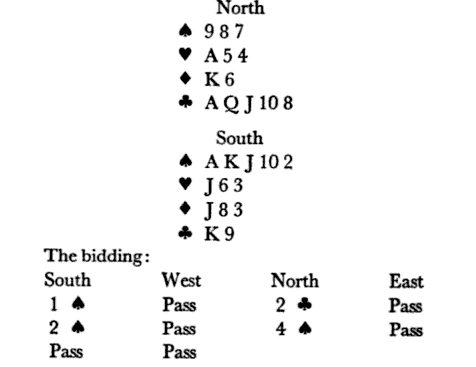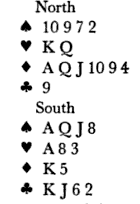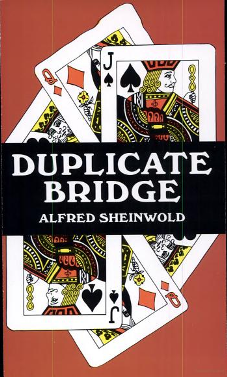Source: Duplicate Bridge By Alfred Sheinwold
You cannot afford to play for safety in a duplicate game. If you find yourself in a normal contract, you must play for every trick that isn’t nailed down. If you’re in a bad contract, you must look for any desperate maneuver that may salvage a few match points from the wreckage. Only if you’re in a very good contract can you afford to play for safety. Let’s take some typical examples:

West opens the deuce of hearts, and you step right up with dummy’s ace. You lead a trump from the dummy, and East plays low. Should you finesse or not?
At rubber bridge you would play the ace and king of trumps. There is, after all, a fair chance that the queen will drop. If it fails to drop, you go after the clubs in the hope of getting rid of a heart or two before the opponent who has the queen of trumps can ruff in. This line of play gives you the best chance for your contract—and you are looking only for the best chance for ten tricks.
In a duplicate game, however, you can’t afford to play for ten tricks when there are reasonable chances to win eleven or twelve. The contract is quite normal, so you must play for maximum.
You win the first trick with the ace of hearts, lead a trump to the ace, return the nine of clubs to dummy’s queen, and lead the nine of spades for a finesse (assuming, of course, that the queen of spades didn’t have the kindness to drop singleton on the first round of trumps). If the finesse succeeds, you will make five spades, five clubs, the ace of hearts, and perhaps even the king of diamonds. If the finesse loses, however, you will almost certainly go down at your game contract.
You would surely play the hand safe for four spades if you were sure that there was no reasonable chance to make five or six. You would even be willing to play safe for ten tricks if you thought that the rest of the field would do the same. You would then be no worse off than anybody else.
The trouble is that two or three pairs are likely to play this hand later in the session at a time when they are hungry for match points. They will go all out for as many tricks as possible. And so will one or two players early in the evening, either because of courage, high spirits, or optimism. Since everybody knows that the hand will surely be played optimistically at several tables, everybody must come to the conclusion that he will have company if he also plays it the same way. If the result is unfortunate, he will tie a few players and thus get at least two or three points.
One more argument before we leave this very important point. One or two declarers may get a favorable opening lead. For example, some luckless defender may pick this inopportune moment to open a trump from the West hand! Or perhaps somebody may open a club. The declarers who get such favorable leads will have the chance to play for overtricks without risking the game.
Your only chance to tie with them is to play optimistically !
In duplicate you are willing to take slight risks with a slam contract if the slam seems very easy to bid. When the slam seems difficult to bid, however, you may play it safe even though you are playing duplicate:

You stagger into a contract of six spades somehow or other. The exact bidding isn’t important since it is bound to be optimistic at best. The combined hands have only 30 points in high cards, but the fit is very fine.
West opens the jack of hearts, and East plays the deuce of hearts at the first trick. How should you plan the play?
If you try a trump finesse, you will make either seven or five. For if West wins with the king of spades he will lead a club at once.
You should not take this risk. If you make the small slam you will have a very fine score, since the chances are that very few pairs will be bold enough to bid the slam. Hence you decide to play it safe for twelve tricks.
After winning the first trick with the queen of hearts, cash the king of hearts. Lead a trump to your ace (resisting the temp-tation to finesse!) and cash the ace of hearts in order to discard dummy’s singleton club.
Only now can you relax and lead a second trump. If all has gone well up to this point, you have nothing to worry about.
Perhaps you may argue that it isn’t absolutely safe to run three rounds of hearts before drawing trumps. That’s true, but absolutes are hard to find at the bridge table. The odds are about 4 to 1 that you will be able to cash three hearts safely; and the odds are only even on the trump finesse. It is surely safer to play for a 4 to 1 shot than for an even money shot.
Esta entrada también está disponible en: Spanish

